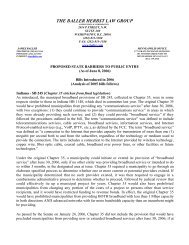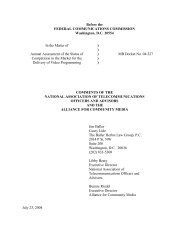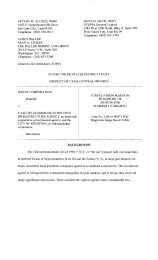Petition for Writ of Certiorari
Petition for Writ of Certiorari
Petition for Writ of Certiorari
You also want an ePaper? Increase the reach of your titles
YUMPU automatically turns print PDFs into web optimized ePapers that Google loves.
17<br />
activities <strong>of</strong> its municipalities. Given this precedent, Section 253(a)’s prohibition on state or local laws that prohibit<br />
the ability <strong>of</strong> “any entity” to provide any interstate or intrastate telecommunications service is not sufficiently clear.<br />
The record in this proceeding contains many letters from Members <strong>of</strong> Congress that state unequivocally<br />
that it was the intent <strong>of</strong> Congress when it enacted section 253 to enable any entity, regardless <strong>of</strong> the <strong>for</strong>m <strong>of</strong><br />
ownership or control, to enter the telecommunications market and that it intended to give the Commission authority<br />
to reject any state or local action that prohibits such entry. We urge Congress to take these views to heart and<br />
consider amending the language in section 253(a) to address clearly municipally_ owned entities. This would allow<br />
the Commission to address the barriers to municipal entry that already exist in several other states, and would further<br />
the goal <strong>of</strong> the 1996 Act to bring the benefits <strong>of</strong> competition to all Americans, particularly those who live in small or<br />
rural communities in which municipally_owned utilities have great competitive potential. We also urge the states,<br />
as the Commission has said be<strong>for</strong>e, to use safeguards other than an outright ban on entry to address any unfair<br />
competitive advantage that they believe a municipally_owned utility may have. The right policy <strong>for</strong> consumers is to<br />
have as many providers <strong>of</strong> telecommunications from which to choose barring entry by municipally_owned utilities<br />
does not give consumers that choice.<br />
SEPARATE STATEMENT OF<br />
COMMISSIONER SUSAN NESS<br />
Re: The Missouri Municipal League: The Missouri Association <strong>of</strong> Municipal Utilities; City Utilities <strong>of</strong> Springfield;<br />
City <strong>of</strong> Columbia Water & Light; City <strong>of</strong> Sikeston Board <strong>of</strong> Utilities<br />
<strong>Petition</strong> <strong>for</strong> Preemption <strong>of</strong> Section 392.410(7) <strong>of</strong> the Revised Statutes <strong>of</strong> Missouri,<br />
Memorandum Opinion and Order, CC Docket No. 98_122.<br />
I write separately to underscore that today’s decision not to preempt a Missouri statute does not indicate<br />
support <strong>for</strong> a policy that eliminates competitors from the marketplace. In passing the Telecommunications Act <strong>of</strong><br />
1996, Congress sought to promote competition <strong>for</strong> the benefit <strong>of</strong> American consumers.<br />
In the Telecommunications Act, Congress recognized the competitive potential <strong>of</strong> utilities and, in section<br />
253, sought to prevent complete prohibitions on utility entry into telecommunications. The courts have concluded,<br />
however, that section 253 is not sufficiently clear to permit interference with the relationship between a state and its<br />
political subdivisions.<br />
Nevertheless, municipal utilities can serve as key players in the ef<strong>for</strong>t to bring competition to communities<br />
across the country, especially those in rural areas. In our recent report on the deployment <strong>of</strong> advanced telecommunications<br />
services, we examined Muscatine, Iowa, a town in which the municipal utility was the first to deploy<br />
broadband facilities to residential consumers. The telephone and cable companies in Muscatine responded to this<br />
competition by deploying their own high_speed services, thereby <strong>of</strong>fering consumers a choice <strong>of</strong> three broadband<br />
providers. It is un<strong>for</strong>tunate that consumers in Missouri will not benefit from the additional competition that their<br />
neighbors to the north enjoy.<br />
I urge states to adopt less restrictive measures, such as separation or nondiscrimination requirements, to






